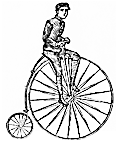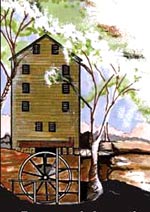Rock Mill
Restoration Project
 Built around 1824, the gristmill in Fairfield County, has seen better days, but there is underway efforts to reclaim this historic mill (some say it is the oldest mill in Ohio).
Built around 1824, the gristmill in Fairfield County, has seen better days, but there is underway efforts to reclaim this historic mill (some say it is the oldest mill in Ohio).
The mill is located along the Hocking River in Fairfield County off SR41 Lithopolis Road (west-north of Lancaster). Rock Mill is 6 stories with two below grade level and originally powered by a 26 ft. overshot water wheel with a mill race cut through solid sandstone more than 30 ft. long.
If you visit you'll notice the mill is undergoing restoration. Visitors are cautioned to watch their step since it could result in a fall of more than 40 ft. onto the rocks below.
The original Rock Mill was erected in the spring of 1799 by two Yankees, Joseph Loveland and Hezekiah Smith. They later built a store near the mill and, in order to accomodate travelers passing through the area, opened the Blue Ball Tavern.* In 1820, 21 years after the original construction, the mill was destroyed during a flood. A replacement mill was built in 1824 on higher ground.
A local mill was important for grain farmers in the area. It meant they could take their crops to the mill, have it ground and packaged for easier storage. At the time, before Rock Mill was constructed, the only mills were located in Pennsylvania, Virginia or Kentucky. Having a mill in central Ohio meant the rich farmlands could be farmed and the crops sold. With the completion of the Ohio and Erie Canal system, central Ohio farmers could sell their crops to a world market.
*Blue Ball Tavern: You might notice more than one Tavern named "Blueball Tavern" in your travels around the country. This was the name given by locals to a local tavern because it usually had a blue ball outside the tavern. During the late 18th and early 19th centuries, innkeepers along stagecoach routes across Delaware, Pennsylvania, and Ohio developed a signal to let illiterate drivers know whether they needed to stop and pick up passengers. Each innkeeper attached a large ball painted blue to a pole in front of his tavern. If passengers were waiting to board the stagecoach, the innkeeper would raise the ball. Otherwise, it would remain lowered, and the stagecoach driver could pass by without stopping.



